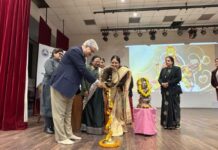Endoscopic skull base surgeons Dr. Dhandapani SS & Dr. Rijuneeta from PGIMER, Chandigarh, have performed total removal of complex planum meningioma, adherent to neurovascular structures through the nose in 2 patients using 4K endoscope system, probably a first in this region.
48 years male & 46 years female were referred to PGIMER, Chandigarh, with complaints of decreased vision. Their MRI revealed planum meningioma of size 3 cm at the base of the skull, abutting critical vascular structures such as anterior cerebral and internal carotid arteries on both sides, as well as neural structures such as both optic nerves and pituitary stalk. These tumors are usually operated on through open surgery, and the remaining part is treated with radiation. Over the last few years, simple tumors are being removed through the nose endoscopically by neurosurgeons teaming with ENT surgeons. However, endoscopic removal through the nose is highly challenging in complex meningiomas close to neurovascular structures.
Dr. Dhandapani chose the endonasal corridor, as the skull opening and brain retraction are avoided if operated through the nose. The team studied the patients in detail using CT angiography navigation and planned for endoscopy. 4K endoscope system, installed recently in the Neurosurgery department of PGIMER, was utilized. Compared to full HD, 4K system provides 4 times better resolution. GA was provided by Dr Shalvi & Dr Rajeev, and surgery assisted by Dr Sidharth. The tumors were very firm and had to be dissected meticulously from blood vessels of the brain, using angled endoscopes and could be finally removed totally through the nose. As endonasal endoscopic surgery of brain tumor can cause brain fluid leakage through the nose, the vascularized flap taken from inside the nose was used to seal the operative corridor along with fascia and glue. After a 6 hour long surgery, the blood loss was less than 400ml. Patients were kept in the ICU and are recovering well. Vision has improved in both patients, with CT scans showing almost complete removal.
Dr. SS. Dhandapani’s team has previously also achieved many feats in endoscopy, including the first in the world to totally remove craniopharyngioma through the nose in a 16-month toddler.

















